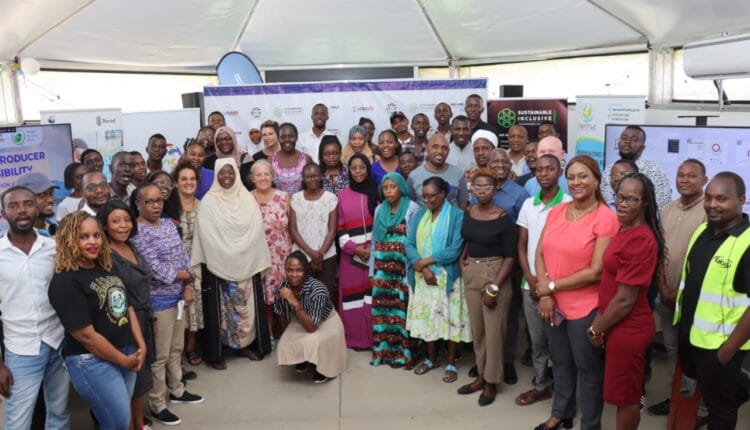KEPSA Calls For The Gazettement Of The EPR Regulation And 100% Implementation Of The Ban On The Single-Use Plastic Carrier Bag
The Kenya Private Sector Alliance (KEPSA), through its knowledge centre, Sustainable Inclusive Business Kenya (SIB-K), has today convened the second Extended Producer Responsibility (EPR) Regulation Sensitization Workshop in Mombasa.
The workshop is part of a series of events by KEPSA aimed raising awareness about EPR to the private sector and its mandate, with funding by USAID under Prosper Africa.
The workshop called for proactive compliance among producers and facilitated a dialogue between the private sector and NEMA, the regulatory authority.
The implementation of the EPR currently focuses on data and cleaning up the environment
According to Karin Boomsma, the Sustainable Inclusive Business Project Director, the extended producer responsibility should ultimately lead to conscious use of materials, careful use of resources, and informed decisions on design to ensure we reduce, reuse, repurpose, and recycle materials.
“To implement this, we all have a responsibility. And we are all accountable. It requires a new system that works for all, from the National level to the county level, for businesses, collectors, circulators, innovators, NGOs, civil society, and citizens.
While finding a way to rethink, redesign, and implement EPR, we need everyone to understand legislation and law very simply. Aggressive communication and awareness are critical to reaching the mass audience until everyone understands why we must change our ways.
This series of workshops presents a platform for genuine and honest conversations and accountable action across the entire value chain,” she said.
Dr. Ayub Macharia, the Director of Environmental Compliance at the National Environment Management Authority (NEMA), commended Kenya’s significant steps in implementing the Extended Producer Responsibility.
“We are not 100 percent, but we are progressing. NEMA is working closely with the private sector and all the county governments to actualize the implementation of the EPR on the ground. But we need more action.
We need the producers to ensure the collectors recognize their products and that the benefits trickle down to the waste pickers,” he underscored.
On the other hand, the manufacturing sector called for the finalization of the EPR regulations to support the operationalization of the National Waste Management Act of 2022.
“KEPSA is committed to sustainable waste management but calling for collaboration with NEMA through assisted compliance and not creating discomfort for the manufacturing sector.
We are also expecting the government to provide tax reliefs or tax holidays for investments in those recycling and producing eco-products, among other things,” emphasized Georgina Wachuka, the Regulatory and Compliance Executive at the Kenya Association of Manufacturers (KAM).
This was echoed by the CEO of the Packaging Producer Responsibility Organization (PAKPRO), Joyce Gachugi, who noted that the members under the PRO are wholly committed to implementing regulation in Kenya.
“As a front runner in implementing EPR for packaging materials, we are keen to have the draft Extended Producer Responsibility Regulations gazetted to allow us to catalyze the deployment of financial resources to manage packaging pollution in all 47 counties of Kenya,” said Joyce.
Like many other counties in Kenya, Mombasa County is experiencing rapid economic growth characterized by increased private and public sector investment, social development, state-of-the-art infrastructure, and a relevant policy-enabling environment.
However, unsustainable waste management practices have exacerbated sustainability challenges, including environmental deterioration.
“We’re not an exception in the struggle against waste pollution and unsustainable management practices. The law is clear. If your product generates waste, you must ensure it is not found in the environment.
The County Government lacks the resources to take the waste responsibility solely, and we must therefore work collectively with the private sector and diligently implement the Mombasa County Solid Waste Management Act alongside the EPR regulation,” said Rogers Wangila, the Head of Solid Waste Management in Mombasa County Government.
Furthermore, most brands in Kenya still rely on the traditional take-make-dispose model, resulting in the overexploitation of resources beyond their regenerative capacity and an increase in the generation of pollutants into the environment.
Therefore, introducing the Extended Producer Responsibility system in the country seeks to hold producers accountable for recovering waste from their products at their end-of-life cycle.
It advocates for increased awareness of responsible consumption, production, and collective action to share roles and responsibilities to promote the circular economy agenda.
The workshop brought together stakeholders from NEMA, Coast Region County Government including Mombasa, Kilifi, Lamu, and Kwale, businesses from different sectors of the economy, including manufacturing, the hospitality sector, and actors in formal and informal waste management, including collectors and recyclers.
These are stakeholders who, despite the delayed gazettement of the EPR regulation, are already at the forefront with EPR-focused initiatives and strategies.



